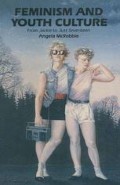Abstract
Although ‘youth culture’ and the ‘sociology of youth’ — and particularly critical and Marxist perspectives on them — have been central strands in the development of cultural studies over the past fifteen years, the emphasis from the earliest work of the National Deviancy Conference (NDC) onwards has remained consistently on male youth cultural forms.1 There have been studies of the relation of male youth to class and class culture, to the machinery of the State, and to the school, community and workplace. Football has been analysed as a male sport, drinking as a male form of leisure, the law and the police as patriarchal structures concerned with young male (potential) offenders. I do not know of a study that considers, never mind prioritises, youth and the family. This failure by subcultural theorists to dislodge the male connotations of ‘youth’ inevitably poses problems for those who are involved in teaching about those questions. As they cannot use the existing texts ‘straight,’ what other options do they have?
This article originally appeared in Screen Education, Spring 1980, no.39.
Preview
Unable to display preview. Download preview PDF.
Notes and references
Among the more important books are: J. Young, The Drugtakers: The Social Meaning of Drug Use, London, Paladin, 1971; S. Cohen, Folk Devils and Moral Panics: The Creation of the Mods and Rockers, London, MacGibbon & Kee, 1972; S. Hall and T. Jefferson (eds) Resistance through Rituals, London, Hutchinson, 1976; D. Robbins and P. Cohen, Knuckle Sandwich, Harmondsworth, Penguin, 1978; P. Corrigan, Schooling the Smash Street Kids, London, Macmillan, 1979; P. Willis, Learning to Labour, Aldershot, Saxon House, 1977; D. Hebdige, Subculture: The Meaning of Style, London, Methuen, 1979.
See, for example, S. Sharpe, Just Like a Girl, Harmondsworth, Penguin, 1977; A. M. Wolpe, Some Processes in Sexist Education, London, WRRC Pamphlet, 1977; A. McRobbie, The Culture of Working-Class Girls, (see Chapter 2 of this volume) and CCCS Women’s Studies Group (eds) Women Take Issue, London, Hutchinson, 1978; D. Wilson, ‘Sexual Codes and Conduct’ in C. Smart and B. Smart (eds) Women, Sexuality and Social Control, London, Routledge & Kegan Paul, 1978.
P. Willis, Learning to Labour, Aldershot, Saxon House, 1977.
See, for example, Willis, Profane Culture; and also ‘The Cultural Meaning of Drug Use’ in Hall et al. (eds) Resistance through Rituals.
S. Rowbotham, Woman’s Consciousness, Man’s World, Harmondsworth, Penguin, 1973.
Born to Run, B. Springsteen, copyright.
This is well-documented in I. Taylor, P. Walton and J. Young (eds) Critical Criminology, London, Routledge & Kegan Paul, 1975.
Willis, Learning to Labour.
See R. Coward’s angry response to this debate, ‘Culture and the Social Formation’ in Screen, vol. 18, no. 1, Spring 1977.
Interview with P. Meaden, New Musical Express, 17 November 1979.
Jackie magazine, however, continues to warn girls against being too flamboyant in dress & personal style. See Chapter 6 of this volume.
Quoted in Hebdige, Subculture.
See, for example, N. Polsky Hustlers, Beats and Others, Harmondsworth, Penguin, 1971.
R. Barthes, Mythologies, London, Paladin, 1972, quoted in Hebdige, Subcultures.
E. Cowie, ‘The Popular Film as a Progressive Text: A Discussion of Coma’, Part I, in M/F, no. 3, 1979.
Copyright information
© 1991 Angela McRobbie
About this chapter
Cite this chapter
McRobbie, A. (1991). Settling Accounts with Subculture: A Feminist Critique. In: Feminism and Youth Culture. Youth Questions. Palgrave, London. https://doi.org/10.1007/978-1-349-21168-5_2
Download citation
DOI: https://doi.org/10.1007/978-1-349-21168-5_2
Publisher Name: Palgrave, London
Print ISBN: 978-0-333-45264-6
Online ISBN: 978-1-349-21168-5
eBook Packages: Palgrave Religion & Philosophy CollectionPhilosophy and Religion (R0)

